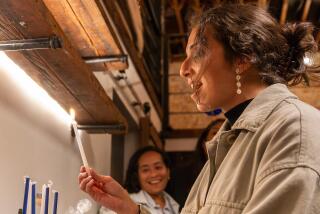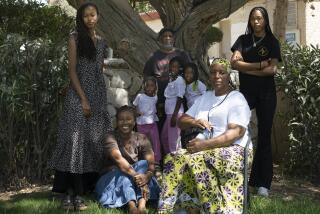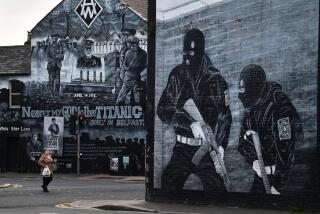Ireland’s Jews Face Shrinking Population
- Share via
DUBLIN, Ireland — European Jews seeking a better life settled in Ireland over the centuries, and many rose to prominence in an overwhelmingly Roman Catholic society.
Now the hardships that have made generations of Irish leave their ruggedly beautiful land also are affecting young Jews.
Some seek greater opportunity in Britain and the United States. Others go to Israel.
The number of Jews in the Irish Republic and British-ruled Northern Ireland has declined by more than half from a population of 5,400 at the end of World War II.
“I envisaged this happening,” said Raphael Siev, curator of the Irish Jewish Museum in Dublin. “We must save some of the records, the material, and describe the lives of Jewish people in Ireland.”
He said about two dozen Jews leave each year, and the number remaining could fall to a few hundred in a matter of decades.
The 5-year-old museum’s collection includes the wedding picture of Esther Steinberg, the only known Irish victim of the Holocaust. There is an autographed photo of Chaim Herzog, president of Israel, who was born in Belfast and grew up in Dublin.
Siev, 55, has included some of his own family memorabilia, along with information about Irish-Jewish authors and other prominent personalities. A restored synagogue is part of the museum in an area once called Little Jerusalem.
Jews expelled from Spain and Portugal arrived in Ireland in the 15th Century. Others came from Poland and Lithuania as anti-Semitism increased near the end of the 19th Century.
When asked how Jews bound from Lithuania to America wound up in Ireland, Siev’s eyes twinkled.
His story: When the ships stopped in such Irish ports as Limerick and Cork before the difficult Atlantic crossing, Lithuanian Jews asked the captains where they were.
“Ireland” sounds like Yiddish for “your country,” which convinced some passengers they had reached the New World.
“So a few of them, of course, hopped off, saying, ‘Well, this is fine,’ ” Siev said in the brogue of the land.
He and many other Irish Jews trace their roots to Lithuania, although some ancestors reached the Emerald Isle by way of England.
Robert Briscoe was Lord Mayor of Dublin in 1956 and 1961. His son Ben, a member of Parliament for 25 years, held the post in 1988.
“My father’s proudest boast always was that the fact he was Jewish had nothing to do with him becoming Lord Mayor of Dublin; if you deserved an honor in Ireland, you got it,” Ben Briscoe said.
With the exception of a pogrom in Limerick in 1904, Ireland has been notably tolerant of its Jews.
Roman Catholics make up 94% of the 3.5 million people, however, and occasional tensions are inevitable.
Jewish leaders bitterly criticize Ireland’s refusal to accept more than about two dozen Jewish immigrants in the 1930s, when European countries sought havens for the refugees from the increasing menace of Nazism.
Ireland was neutral in World War II, and recently declassified documents show that authorities feared an influx of Jews would spur anti-Semitism.
Ronit Lentin, an Israeli married to an Irish Jew who is a television producer, says she feels an “undercurrent of anti-Semitism.”
“My husband can still be told by people, ‘But you’re not really Irish,’ ” she said. “Now, how Irish is Irish? He was born in Ireland, and his father was born in Ireland. When do you become Irish? When you become Catholic, this is the answer.”
Lentin, a 45-year-old journalist, said she would not be surprised if her teen-age children eventually left Ireland.
More to Read
Sign up for Essential California
The most important California stories and recommendations in your inbox every morning.
You may occasionally receive promotional content from the Los Angeles Times.










